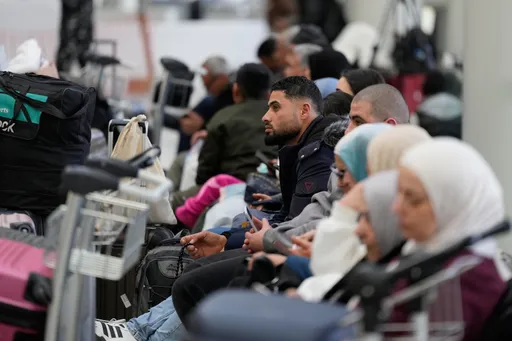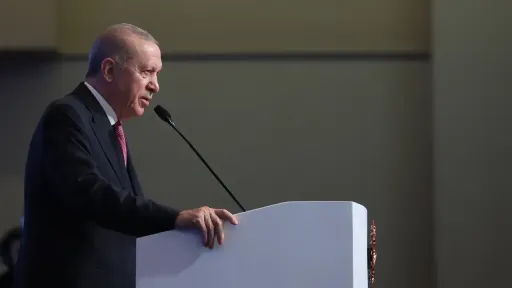Tens of thousands in Uganda's capital, Kampala, use speeding motorcycles, known locally as boda boda, as an essential means of transport.
The motorcycle-taxis are ubiquitous in East African capitals like Nairobi and Kigali. But nowhere in the region have boda-boda numbers been surging more dramatically than in Kampala, a city of 3 million people, no mass transit system and rampant unemployment.
An estimated 350,000 boda-bodas operate in Kampala, driven by men who come from all parts of Uganda and say there are no other jobs for them.
“All of us here, other people even, they have their degrees, they have their master’s (degrees), but they are just here. They have nothing to do,” said one driver, Zubairi Idi Nyakuni.
The boda-boda men, who operate mostly unregulated, have resisted recent attempts to dislodge them from the narrow streets of Kampala’s central business district, frustrating city authorities and underscoring the government’s fears over the consequences of angering a horde of jobless men.
“We must appreciate where the boda-boda comes from, how this whole phenomenon grew,” said Charles M. Mpagi, spokesman for Tugende, a Kampala-based company that specialises in financing boda-boda purchases.
“You have quite a large number of people that are young, who can’t find jobs to do, whether in the public sector or the private sector, and they do not have significant alternative income to get into other enterprises.”
About 76% of Uganda’s 43 million people are under 35, according to government figures. Jobs are scarce in an economy where just 1% of 22.8 million employees make $270 or more in monthly pay, according to central bank figures released earlier this year.
Uganda’s unemployment rate — as a proportion of unemployed people to the total labor force — grew from 9% in 2019 to 12% in 2021, according to the most recent survey by the Uganda Bureau of Statistics. The unemployment rate for people between 18 and 30 was even higher, at 17%. For young people in urban areas, it was 19%.
President Yoweri Museveni has long embraced boda-boda men as mobilizers of political support. Political rallies come alive with the hooting from their motorcycles, whose commotion can bring communities to a standstill.
Motorcycles as a means of transport first emerged on the Uganda-Kenya border during political instability in the 1970s, with the term “boda-boda” traced to drivers who shouted “border, border” at potential customers.
Now they are everywhere in Uganda, taking children to school, people to offices, the sick to clinics, and even the dead to their graves.
When Uganda’s transport minister was wounded by gunmen who killed his daughter in 2021, a boda-boda man rushed him to the hospital. But the attackers also drove motorcycles and fled.
Annual police reports cite motorcycle taxis in abetting violent crime, and the number of fatal accidents related to motorcycles across Uganda grew from 621 in 2014 to 1,404 in 2021, according to the Ministry of Works and Transport.
“We’ve been struggling with these motorcycles,” said Winstone Katushabe, a government commissioner in charge of transport regulation. “It is not a good situation.”
A culture of non-compliance with traffic and road safety rules has proliferated among boda-boda men, he said, adding that establishing official motorcycle taxi stands in Kampala would help bring order.
Road safety regulations for motorcycles, first approved in 2004, are difficult to enforce because of the overwhelming number of boda-bodas.
Traffic police look on as boda-boda men zip through traffic lights and overtake dangerously. They are often unable to make arrests because of the risk to public order as drivers quickly stand up for one another, causing a crowd.
The boda-boda phenomenon has grown as Uganda's president has stayed in power.
In recent years, trying to weaken support among unemployed people for his opponents, Museveni has gifted boda-bodas to supporters and pledged to reduce the three-year licensing fee from nearly $100.
The fee will drop to about $35 under new rules announced earlier this month, according to the Transport Licensing Board. That would make it even easier to become a boda-boda man.
The other entry price is about $1,500 for a new motorcycle, often the Indian-made Bajaj.
Many boda-boda men acquire equipment on credit through companies such as Tugende. Others work for businesspeople who buy motorcycles in bulk and distribute them among drivers but can repossess them if drivers are behind on payments.
Boda-boda men who lack driving licenses and crash helmets risk having their motorcycle impounded by police. Some drivers told the AP their aggressive behavior on the roads is driven by that fear of arrest or seizure.
Innocent Awita, a boda-boda man who dropped out of school in 2008, said there was “too much pressure” to keep his motorcycle. He’s required to pay his employer the equivalent of $4 a day in addition to fuelling and maintaining it. A falling-out with his employer could render him jobless.
Some days are better than others, but Awita said he sometimes goes without enough earnings to make the daily payment.
“I can work for three days without getting anything. But if I get something the next day, that can save my life," he said.
➤Click here to follow our WhatsApp channel for more stories.























